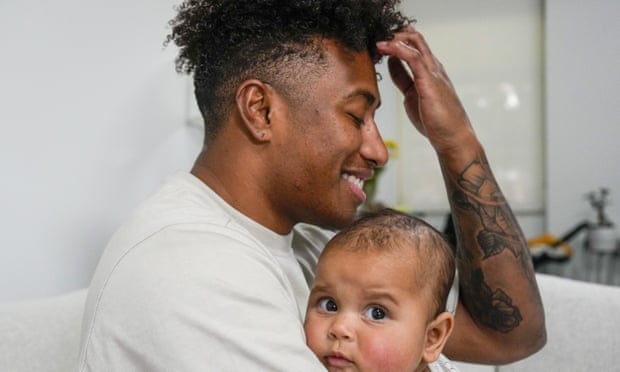Sevuloni Lule, a professional dancer from Lautoka City in western Fiji, is causing a stir on Shenzen’s club scene in China.
Or rather, his drag alter ego – Savanaah Marco LaVulva – is.
By day, Lule performs Pacific dances at Window of the World, a kitschy theme park in Shenzen’s Nanshan district. At night, he puts on a wig and makeup to transform into LaVulva, a fierce drag queen who lip-syncs to Rihanna and Beyoncé at the city’s LGBTQ+ friendly bars and nightclubs.
“She’s a music video vixen come to life, she brings a powerful energy to the stage,” says Lule, 29, of LaVulva, who is inspired by 90s and early 2000s divas.
It’s a far cry from life in Fiji four years ago, where he stepped out in drag once to go to a club with friends in Suva. “At the time I looked at Savannah as a one-time thing and it was fun but I didn’t take it seriously as I do now.”
Lule was taunted and bullied through most of his school years in Fiji. Boys would call him names so he learned “to mask my emotions and bottle things up.”
He did not think his devout Methodist family would understand his identity, and so music and dance became a safe refuge. At 21, he joined Fiji’s premier dance company Vou Dance which led him to China six years later, along with three other dancers from Fiji.
“In Shenzen, I found the freedom to be myself,” he said, “And I found community.”
Lule plans to return to Fiji next year, and share what he’s learned about the art of drag with the local LGBTQ+ community.
He’s one of a growing number of queer entertainers and influencers with Fijian heritage challenging gender norms.
Many of them, like Lule, are now based outside of Fiji, but their work and stories are followed closely by those back home.
Shaneel Lal, a Fijian-New Zealand LGBTQ+ rights activist, model and writer, has been a key figure in the movement to ban conversion therapy in New Zealand.
Ellia Green, who represented Australia in women’s rugby sevens at the Rio Olympics, winning gold, came out as a transgender man in August.
It was a big moment, said Abdul Mufeez Shaheed, the program manager of the Rainbow Pride Foundation Fiji.

“Rugby is a huge part of Fijian culture and to see Ellia Green affirming his gender identity publicly… is a huge step forward in the work around LGBTQ+ rights for the Pacific. We need champions like Green in different sectors who can help advance dialogue on diversity.”
And then there is Shaheel Sanil Prasad, a 24-year-old LGBTQ+ influencer, who performs as Shaheel Shermont Flair.
Prasad, from the outskirts of Fiji’s capital Suva, has become a viral international sensation after posting a fashion catwalk video on TikTok in July. In the video titled “Fashion shows be like”, Prasad pokes fun at fashion’s high concept runways.
The video, which attracted over 30m likes and international press coverage, has turned Flair into a minor celebrity in Fiji. But it also attracted hate.
“The hate has always been there from when I started because of my sexuality,” said Prasad, who is openly gay and advocates for LGBTQ+ rights.
For now, he is focusing on the positives. “There are so many great comments that I can reply to and appreciate instead,” he said.
As a sign of changing times, Prasad has parlayed the fame into paying gigs with Fijian brands and companies that have historically not embraced the LGBTQ+ community.
How it all started 😂😂 pic.twitter.com/SKX7E6I1nN
— Shaheel Shermont Flair (@ShermontFlair) July 28, 2022
n”,”url”:”https://twitter.com/ShermontFlair/status/1552654923497881602?s=20&t=MhZ4D3tHB4w35ssxfNPWYw”,”id”:”1552654923497881602″,”hasMedia”:false,”role”:”inline “,”isThirdPartyTracking”:false,”source”:”Twitter”,”elementId”:”01bf8324-e555-44bc-b04b-4962e1046c16″}}”/>
According to the Rainbow Pride Foundation, a not-for-profit organization that advocates for LGBTQ+ rights in Fiji, homophobia is still rife within the country.
While Fiji’s 2013 constitution provides broad protection to the LGBTQ+ community, they continue to experience unequal treatment in many areas, including being denied access to sexual and reproductive health services, being barred from adoption and being unable to pass on inheritances and make medical choices for their partners.
Shaheed, from the Rainbow Pride Foundation, says that the popularity of LGBTQ+ entertainers often masks the struggles faced by the community.
“Fiji’s LGBTQ+ creators are tolerated as long as they produce entertaining content and nothing serious about their rights,” said Shaheed.
“An LGBTQ+ person’s worth in Fiji is linked to how they conform to boxes that society puts them in. They are seen as entertainers. They are part of dance groups, choirs and entertainment at weddings and events, and in the tourism and fashion industries. So LGBTQ+ validation comes from within these professions and sectors. While this may help socio-economically, they are still boxed and limited.”
But Lule says that as the number of influential queer artists increases, perceptions of LGBTQ+ people and discussions about their rights are changing.
“I think a shift is already happening. There are some very influential LGBTQ+ artists in Fiji who are advocating for issues relating to the community but we have a long way to go,” said Lule.
After years away, he has reservations about returning to Fiji and being able to continue to express himself. But he remains optimistic.
“I have a good feeling that coming back and sharing my experiences might help inspire change. I’m staying positive about that.”
www.theguardian.com
George is Digismak’s reported cum editor with 13 years of experience in Journalism